Student Blog
School/Life Balance

Day In the Life of an Undergraduate BS-OTD Student Vlog ⟩
December 10, 2024, by Avery
Classes Community Getting Involved Living in LA School/Life Balance Videos
Join me as I take you through what a typical day looks like as an undergraduate student in USC Chan’s accelerated Bachelor’s to Doctorate program in Occupational Therapy! One of the things I love most about this program is the balance it allows me to strike between my occupational therapy (OT) courses, engaging electives, general education classes, extracurriculars, and free time.
From participating in enriching clubs and student organizations to spending quality time with friends and exploring the vibrant city of Los Angeles, I’m able to enjoy a well-rounded college experience while still focusing on my OT studies.
As always, if you have any questions about the BS-OTD program from an undergraduate perspective, feel free to reach out!
⋯
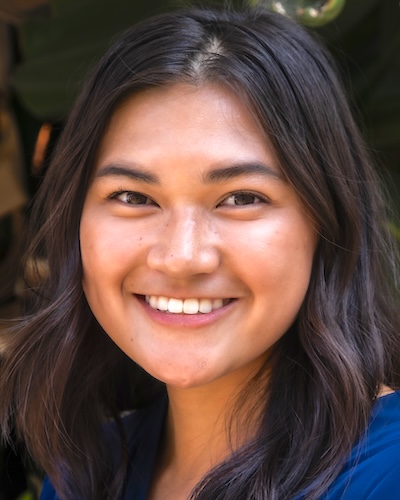
My OS Minor Recommendations ⟩
November 13, 2024, by Cara
Classes Life Hacks School/Life Balance
Spring course registration is already underway, and if you’re still on the hunt for classes to fill up your schedule, you’ve come to the right place! Whether you’re considering a minor in OT or just looking to create a healthier and happier lifestyle for yourself — here are my recommendations.
OT 101: Caring for Your Self: Engaging in Healthy Habits and Routines
OT 101 is all about YOU! This course helps you learn about self-care practices to incorporate in your everyday life, like mindfulness, setting goals, and time management. Throughout the course, I was paired up with another student for weekly meetings where we reflected on our self-care experiences and feelings. Sometimes we did activities together, like yoga, drawing our breath art, or eating. It was a great experience that helped me improve self-awareness and also built a lasting friendship. Since taking this class, I’ve realized how self-care is not a luxury — it’s a necessity for overall wellness. I’ve noticed improvements in my productivity, calm mindedness, and greater self-acceptance by making time for myself. College can often feel like an endless race where we neglect our health and personal needs, but taking time for self-care can make all the difference.
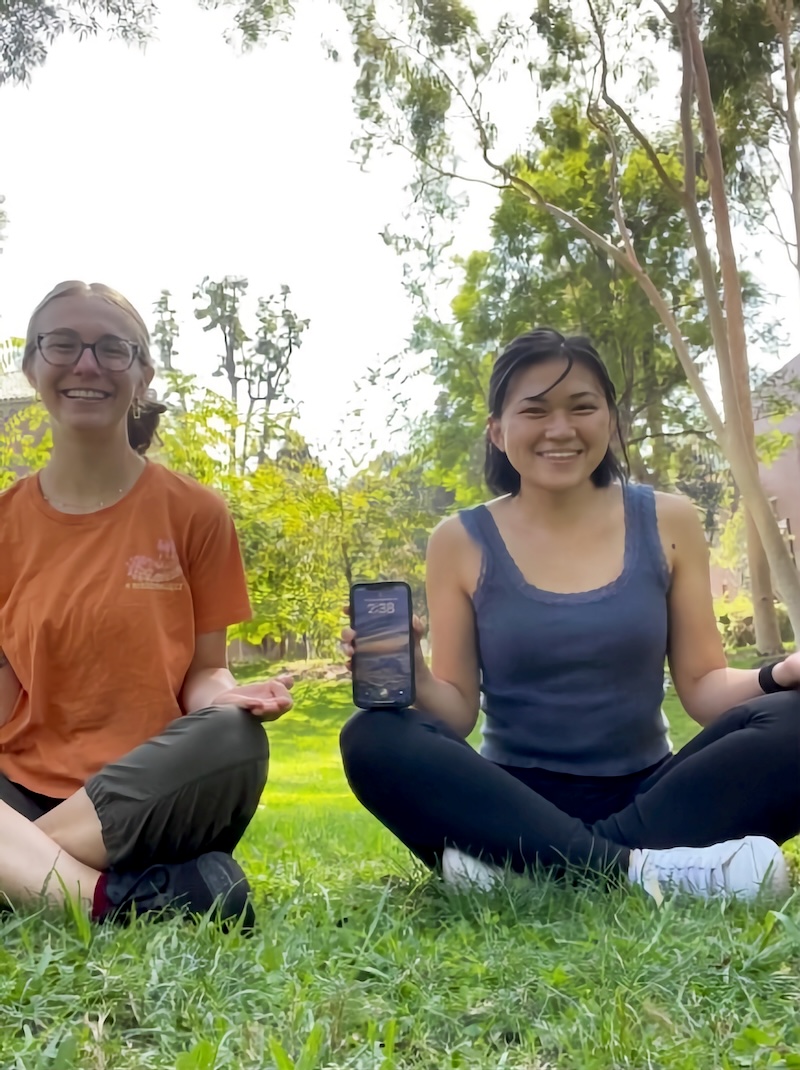
Me and my partner, Mahalia, doing yoga!
OT 251: Across the Lifespan: Occupations, Health, and Disability
In OT 251, I learned about how people grow and change as they go through life and how this affects the activities they find meaningful. We explored human development by looking at different factors like biology, psychology, society, and culture, and how these all connect to shape what people are interested in and value in their lives.
What made this class really fun was the emphasis on building a positive and engaging learning community through peer learning. I often worked in groups on case studies, role-played different stages of development, and did discussions where my group mates and I reflected on our development and how it affects what we do. I really connected with my peers through both our shared experiences and differences, deriving new insights on how development is nuanced. And I still keep in touch with them to this day!
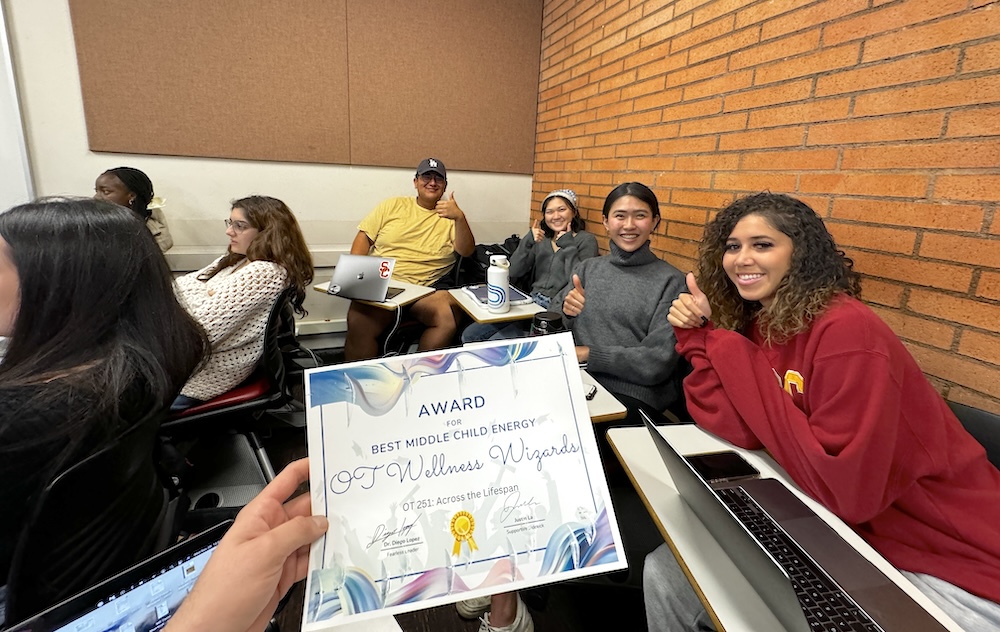
At the end of the semester, my group and I, called the “OT Wellness Wizards,” received the award for “Middle Child Energy.”
OT 340: Animal and Human Interconnection in Daily Life
If you love animals, OT 340 is a must! This course explores the relationship between humans and animals. I learned about K9s, therapy dogs, foster animals, among many others. Occasionally, some furry friends came to visit too. As part of the course curriculum, I spent 8 hours interacting with animals to further understand how humans and animals affect one another. I volunteered at a local shelter, walking German Shepherds for two hours each week. The experience was rewarding, teaching me about humility, compassion, and loyalty. I also found it amazing how animals still love us no matter how we treat them, and continue to persevere to live a better life than before. If that doesn’t convince you, I don’t know what will!
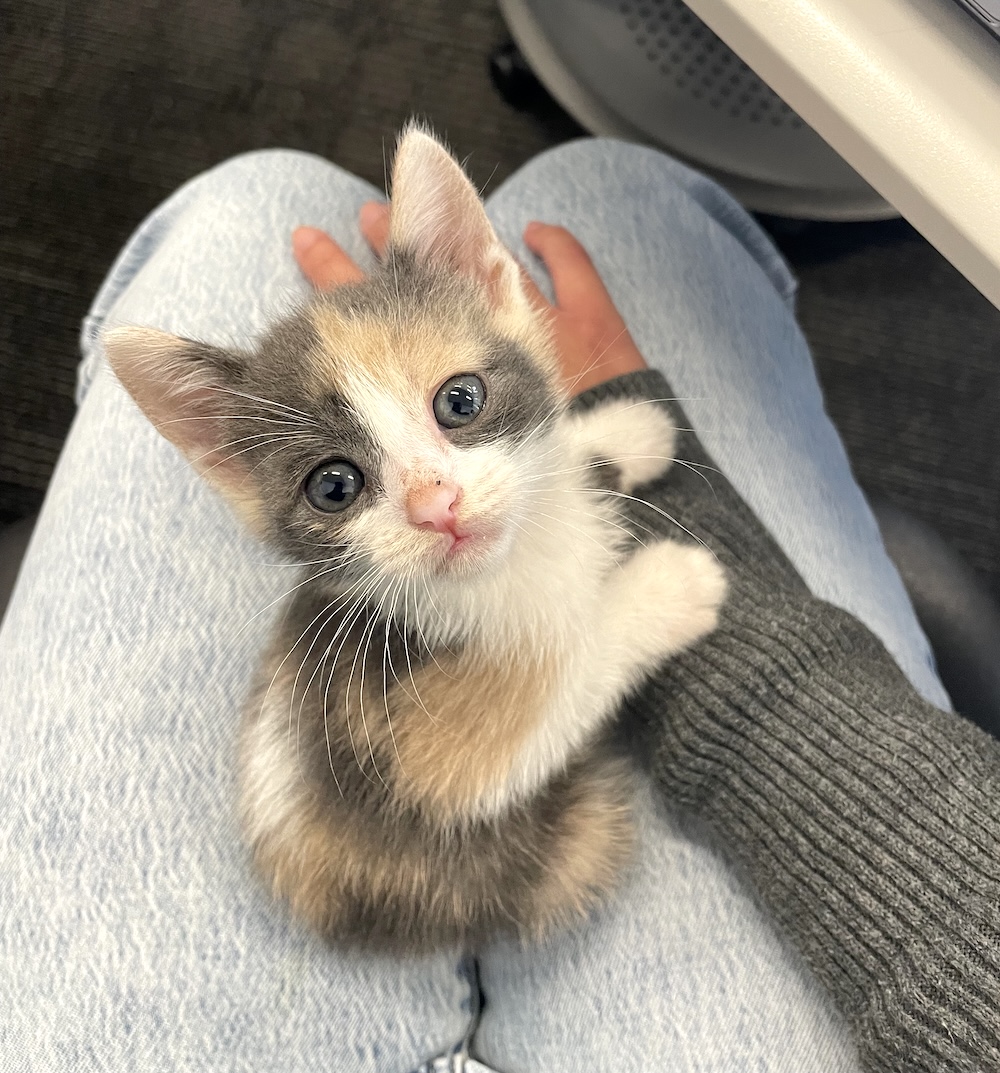

These courses are just a taste of what the OS minor has to offer, and I encourage you to consider them as you finalize your spring schedule. They will deepen your understanding of both yourself and others while providing practical skills you can apply in your everyday life. Check out our other OS courses here!
⋯

How to Find Scholarships (yes, you qualify!) ⟩
November 5, 2024, by Avery
Admissions Life Hacks School/Life Balance
Let’s be honest — education is expensive, especially at USC. That first time you open your financial aid report can be scary and overwhelming. The weight of potential debt and student loans is daunting, and for many of us, staying in school requires tough sacrifices and working multiple jobs just to make ends meet.
One thing that many students don’t realize however, is just how much free money is available to them in the form of scholarships! I’ve heard it all:
“Oh, I don’t think there’s a chance I would actually win the scholarship.”
“I didn’t realize that I qualified!”
“Wait, I didn’t know this many scholarships were out there!”
“I don’t want to take the time to apply when I could be doing other things or just working a job instead.”
In reality, there are numerous independent organizations that WANT to give you their money so that you can pursue your education. Sometimes, it just takes a little digging to get there! I’ll be honest, taking the time to write the essays, figure out the deadlines, and get letters of recommendation is time consuming. This can feel overwhelming and exhausting, especially with the constant demands of schoolwork as a full-time student. However, at the end of the day, the rate of return on these awards is HIGH. Let’s say you spent 3 hours applying for a $500 scholarship. That equates to earning over $160 an hour. Now imagine if that is a $1,000 application? $5,000? It quickly begins to feel like the time applying for scholarships is being much smarter spent than working a few extra hours at a minimum wage job.
So, where to start? I like to begin by researching scholarship opportunities specific to the area where I am from. While many of these local scholarships are only available for high school seniors, I was really surprised to find out my freshman year that quite a few of them have money available for those already in college as well. These awards are great as they are designated only to a specific area or field, meaning less people can apply = you have a better chance of receiving the money.
Now let’s look towards USC specifically. To begin, when applying to USC (undergrad or OT school), be sure to hit that November 1st EA deadline so that you can be considered for the large merit-based scholarships that are available.
The Chan website has links to resources of external scholarships. The list is long, which means there have to be at least a few you qualify for. My advice is to open a Google Spreadsheet, make columns to label the due date, amount, name of award, link, and basic things needed to apply (essay, letter of rec, transcript, etc). Then, go through every award and add any to your spreadsheet that you meet the criteria to apply to. This will keep you organized and will help to not let any deadlines sneak up on you.
![]()
Here is an example of what my scholarship tracker spreadsheet looks like
Chan has a page with resources for their internal scholarships. Add these to your spreadsheet as well.
USC also has several scholarships for those engaged in unpaid research. Check out Dornsife’s SOAR-SURF-SHURE scholarships, as well as Chan’s Occupational Therapy Student Research Fund. These can be incredible opportunities to learn and be involved in something that interests you academically, add to your professional resume, and get ‘paid’ simultaneously.
Next, put together a list of companies you have ties to. Think about places you work, shop, where your family and friends work, where you do your banking, non-profits you volunteer at, etc. There’s a good chance one of these organizations has an annual scholarship award.
Finally, many scholarship search engines exist such as scholarships.com and fastweb.com, where you can filter your search based on your area of study and demographics.
Keep track of those deadlines, and happy applying!
⋯

12 Tiny Habits That Transformed My Life in 6 Months as a Student ⟩
October 29, 2024, by Jowy
School/Life Balance
Hi there! I’m Jowy Cenat, and today I’m sharing the small, consistent habits that changed my life over the last six months. These might seem simple, but trust me — they’ve been game-changers.
“Simplicity is the ultimate sophistication.” — Leonardo da Vinci
1. Two minutes of jump-rope:
No need for an intense workout first thing in the morning. Two minutes of jump rope gets my heart pumping and my mind awake. It’s quick, easy, and surprisingly powerful.
2. Stepping outside:
Nothing beats stepping outside for a bit of fresh air and sunlight. It’s become my morning ritual for alertness and grounding. I’ll sometimes combine this with the jump rope for a two-for-one!
3. Revewing my goals:
Taking a few moments to look over my goals reminds me of what I’m aiming for. It’s like a reset that refocuses my mind and makes those long-term plans more achievable.
4. Reading a passage in the morning:
Instead of checking my phone first thing, I read something inspirational or philosophical. It’s a nice mental start to the day before the notifications start rolling in.
5. Practicing gratitude:
A few moments spent reflecting on what I’m grateful for grounds me. Gratitude has shifted my perspective, helping me start each day feeling more positive and centered.

6. Ending the day with a reflection:
I take a few minutes every night to reflect on the day — what went well, what could be better. This habit has been a great way to learn from each day and to let go of what didn’t work.
7. Keeping a reading habit:
I made it a point to read something every day, even if it’s just a few pages. The consistency has kept me curious, entertained, and always learning something new.
8. Setting micro-goals:
Breaking down big goals into smaller steps has been empowering. Each completed step brings a little victory, making the bigger picture feel achievable.
9. Walking 13,000 steps a day:
Getting my daily steps in has kept me active and energized. Sometimes it’s through a workout, other times just through exploring a park or neighborhood. The movement has done wonders. I was born in NYC, and unfortunately, I miss the walkability of the city.
10. Prioritizing sleep:
I started tracking my sleep and making it a priority. Once I realized how big of an impact rest has on my productivity and mood, it became non-negotiable.
-Sleep-
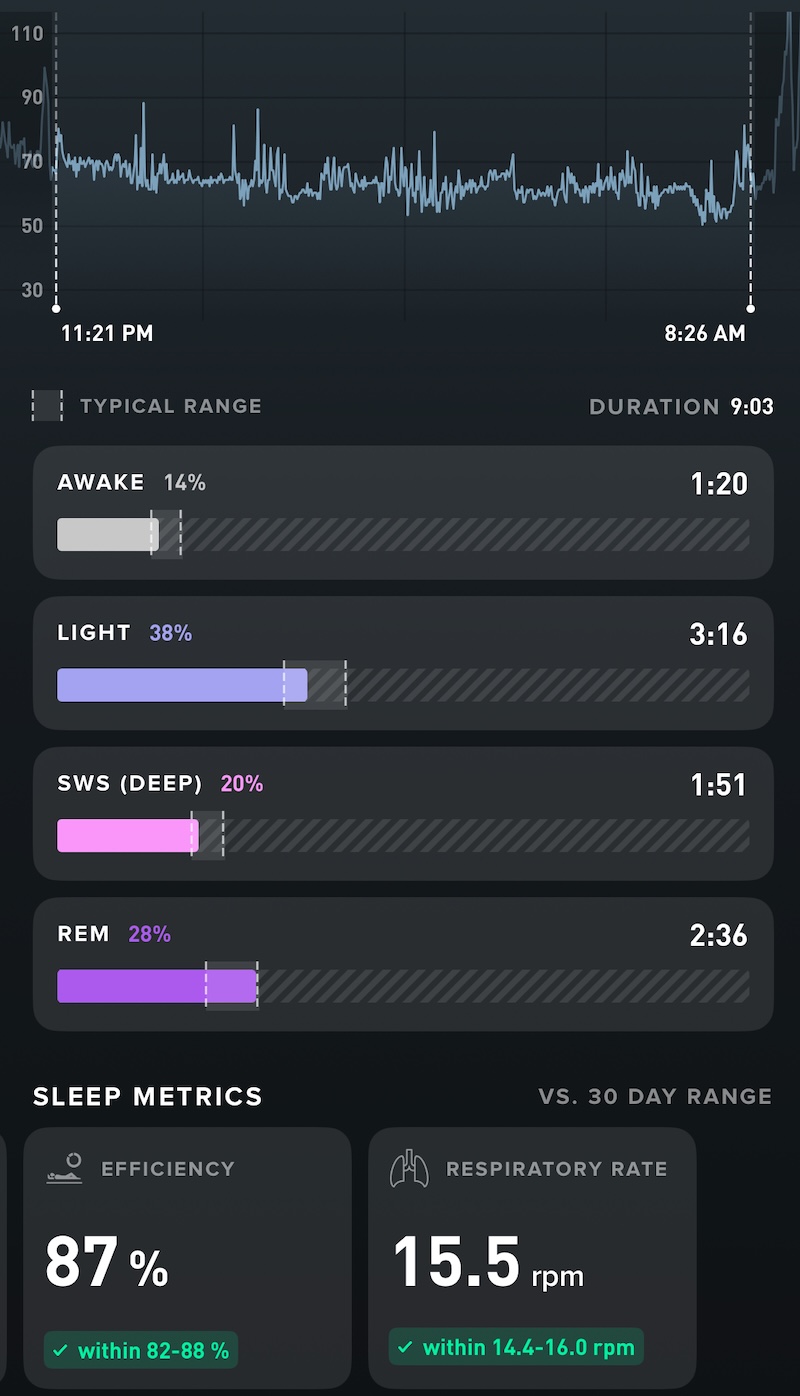
11. Celebrating small wins:
Finally, I learned to celebrate the small wins. Whether it’s hitting my daily steps or finishing a task, I let myself feel proud of those moments. They keep me going and remind me that progress is being made.
Bonus:
Implementing these habits has been an incredible journey. They might seem small, but the impact has been huge throughout my time in the program. Having my own habits, best practices, as well as learning from various courses, like health promotion or lifestyle redesign has been a game changer. I hope you find something here that inspires you!
*If I were to add another #12, I’d say boba + matcha is a tiny habit. Just a small habit . . . but let’s be real, life is better with a little boba and matcha in the mix!
⋯

A Legacy of Hard Work, Perseverance, and Occupation ⟩
September 27, 2024, by Mason
Beginnings and Endings School/Life Balance
Hi everyone! In my introductory blog post, I talked to you all about why I chose to take on the challenge of becoming an occupational therapist. In case you missed it, let me give you a refresher. My mother is a pediatric occupational therapist and has served various populations of children with special needs and developmental disabilities for over 30 years. Growing up around my mother and watching her treat and impact the lives of the children she worked with sparked my passion and lifelong goal to help others. My mother always taught me that no matter what you do, you should leave the world better than you found it, and use your energy, health, and opportunities to help those who have less or do not have the same luxuries. Throughout this program, there have been many times when I doubted myself and my abilities to succeed as a student, clinician, and overall individual. But in those moments I have always had my mother and her lessons to support me.
My mother has always been a key pillar of support in my life. However, my mother was also not shy about pushing me to do my best. Growing up, my mother always had one rule: it was okay to fail as long as you tried your best. In every moment of failure or setback throughout my college years so far I always tried to remember that simple lesson because I knew that my best was within reach if I worked hard and put in the effort. It wasn’t easy to move across the country to a state I had barely visited, work multiple jobs to support myself throughout my education or start a full graduate course load while my friends moved on to full careers after their undergrad. College is not an easy challenge, and it’s not meant to be. After 4 years of strong effort, I still find challenges and overwhelming moments every other week. But I know I can get through it because I have the people around me that make me feel supported.
In a funny way life always comes full circle. This year to my utmost pride, pleasure, and enthusiasm my mother started a new journey of her own and returned to school to earn her post-professional doctorate in occupational therapy. Despite not being in school for almost 30 years and diving into an educational landscape that has changed fourfold, she’s taking on this challenge to grow and better herself, and I couldn’t be more proud. As children, you always view the relationship you have with your parents as a one-sided transaction. They teach you, they support you, and they help you grow to dreams and goals they know you can accomplish. However, as you inevitably grow up and expand in your ability to understand those around you, you begin to realize how much you impact their lives as well. We can teach our parents, we can help them grow, but most importantly we have the ability to support them amid the vulnerability that makes change so scary.
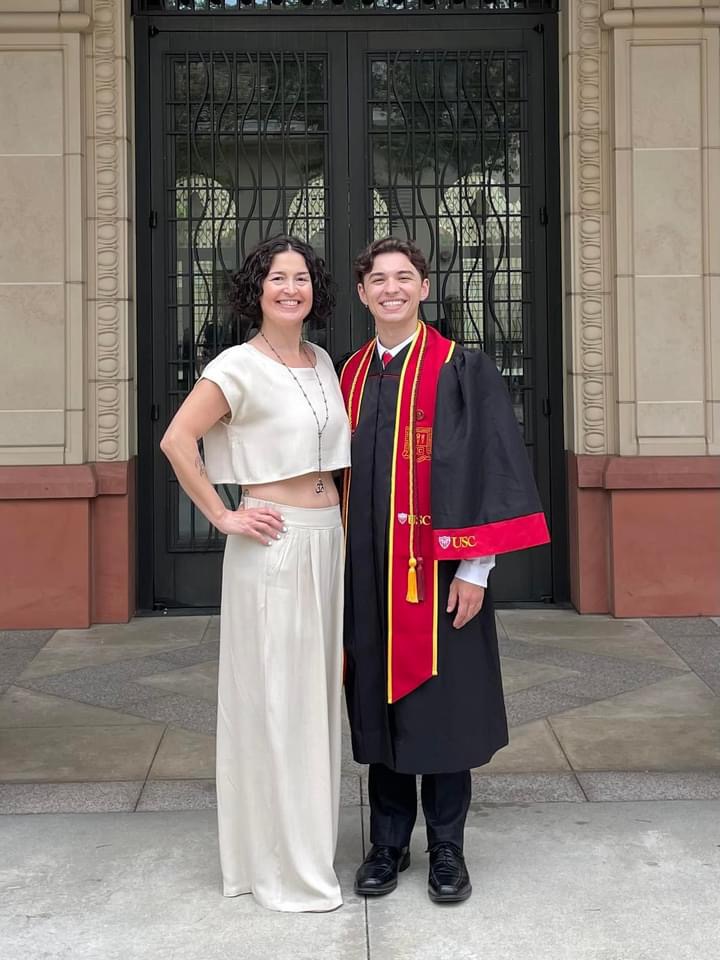
My mother inspired me to become the person I am today, and today I’m lucky enough to inspire my mother to reach the exact same potential she has always seen in me. So when you’re reflecting on the challenges and obstacles that stand in your way, don’t ever forget about the people in your life that lead you to greatness. Cherish those who have always supported you and take any opportunity you can to return the favor by supporting them.
That’s all for now, and remember to Fight On!
⋯





